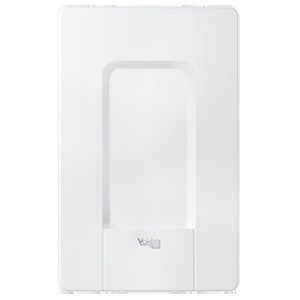Bridging the gap

Neil Saunders, Sales and Marketing Director at Vokèra by Riello, Carrier RLC EMEA, explains why hybrid-ready boilers offer an efficient, cost effective stop-gap solution for heating and hot water without replacing radiators or upgrading a building’s fabric.
The UK’s trajectory toward Net Zero carbon emissions requires a fundamental shift in domestic heating technology. While heat pumps hold significant promise, uptake is proving sluggish. One factor affecting this could be a fundamentallack of knowledge about heat pump solutions throughout the building sector. Meanwhile, the looming 80% reduction in new fossil fuel boiler installations required by 2035 adds urgency and highlights an apparent disconnect between current consumer preferences and the government’s ambitious targets.
This article highlights the compelling benefits of hybrid-ready boilers, which combine the efficiency of renewable technology with the proven technology required for mass adoption.
The consumer challenge
Heat pumps undeniably offer long-term sustainability advantages. However, in many UK homes built around the convenience of combi boilers, a complete switch to a heat pump might require extensive retrofitting, including upgrading the building fabric. While the upfront costs can be offset through the Boiler Upgrade Scheme (BUS), highlighting alternatives to heat pump technology could help accelerate the energy transition.
Hybrid-ready boilers offer a viable and cost effective solution. Smart integration of a heat pump, primarily responsible for space heating, with a high efficiency gas boiler for hot water on-demand preserves familiar user expectations.
This approach supports optimum heat pump operation by providing compatibility with 55°C low flow temperatures. The heat pump then works at peak Coefficient of Performance (CoP), maximising homeowners’ energy savings.
This makes hybrids a compelling choice for those who want to reduce their carbon footprint without the expense and disruption of a complete heating system overhaul. For installers, it means less disruptive retrofits and a smoother pathway to consumer acceptance and compliance with evolving regulations.
Cost: Short term investment, long term returns
While the initial outlay for a hybrid-ready system might cost more than a traditional boiler replacement, a short-term focus obscures the true cost equation. With continued volatility and a conceivable upward trajectory for fossil fuel prices, a hybrid system’s efficiency gains have the potential to offset the initial investment over its lifetime. Government grants offer great incentives for standalone heat pumps, but they would benefit from a recalibration that recognises the long-term cost advantages and carbon reductions achievable by hybrid solutions.
Building awareness and installer expertise
Limited consumer understanding of hybrid systems remains a key challenge. Industry and government bodies should lead a targeted public information campaign that emphasises the long-term energy savings and reduced carbon footprint possible with hybrid technology.
Wider use of hybrid systems would also benefit consumers by giving them first-hand experience of heat pumps, helping to increase their acceptability as mainstream solutions.
This increased awareness must be supported by a comprehensive installer training initiative to boost the number of qualified heat pump installers. Ensuring technicians nationwide are equipped with the necessary skills for advising on, designing, installing and maintaining hybrid systems is paramount for meeting consumer demand and successful long-term implementation.
Efficiency and compatibility: Real-world benefits

Hybrid-ready systems like the Vokèra Unica MAX C are often compatible with existing radiators and deliver substantial efficiency gains compared to conventional boilers, particularly those found in older, poorly insulated homes – 34% of the UK’s housing stock.
Another significant cost benefit is avoiding the need to improve building fabric through improved insulation or new windows – particularly welcome as the necessity for these measures can make projects unaffordable or pose building challenges.
Communicating these advantages using real-world case studies backed by figures for energy savings and carbon reduction is vital to helping installers and homeowners make informed decisions.
The Hydrogen Horizon
Arguably, the most persuasive advantage of hybrid-ready systems is their potential synergy with future hydrogen technology.
While uncertainties remain around commercial viability and the likely timeline for introducing hydrogen in homes, a hydrogen-ready hybrid system offers the benefit of immediate emissions reduction and a clear potential upgrade path to near-zero carbon emission heating. This future-proofing aspect makes hybrid investment a strategically sound choice, mitigating the risk of system obsolescence.
Recalibrating incentives
Existing policy initiatives, such as the revised Boiler Upgrade Scheme, predominantly favour standalone heat pumps. While this focus makes sense, it’s crucial to recognise that hybrid-ready technologies can deliver significant carbon reductions in the short to medium term while addressing consumer hesitation around total system replacements.
A tiered incentive scheme or dedicated financing packages targeting hybrid systems could accelerate adoption, making them a more attractive and accessible option.
The path to mass adoption
Hybrid-ready boilers are a cornerstone solution in helping the UK meet its complex heating challenge. They present a realistic pathway, navigating the gap between immediate energy efficiency requirements, evolving regulations, homeowner preferences for comfort and practicality, and the vision of a future powered by zero carbon heating solutions.
For installers, manufacturers and policymakers, a collaborative approach is paramount. Prioritising investment in hybrid technologies, expanding training programmes to upskill the workforce and targeted awareness campaigns for homeowners are all essential building blocks.
By working together, the industry can unlock the potential of hybrid-ready boilers, paving the way for a realistic and achievable roadmap to greener homes. This collaborative effort will ensure a successful green transition that brings homeowners and installers on board and empowers them to participate actively in achieving the UK’s 2050 Net Zero ambitions.







